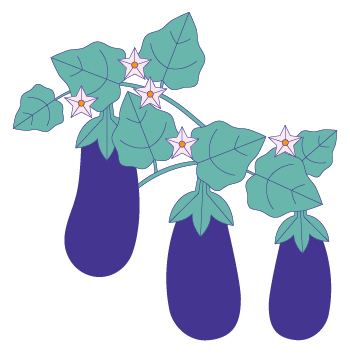GMOs Outside the U.S.
A Closer Look at Bt Eggplant
Eggplant is a large part of people’s diets in Bangladesh. An insect called the eggplant fruit and shoot borer can destroy entire harvests of eggplant, affecting the lives of the farmers who grow it and those who eat it daily.
The U.S. Agency for International Development (USAID) helped Bangladeshi scientists develop locally adapted varieties of genetically engineered eggplant that are highly resistant to the eggplant fruit and shoot borer. “GMO” (genetically modified organism) is the common term consumers and popular media use to describe a plant, animal, or microorganism that has had its genetic material (DNA) changed using technology that generally involves the specific modification of DNA, including the transfer of specific DNA from one organism to another. Scientists often refer to this process as genetic engineering.[1]
Bt Eggplant
Bacillus thuringiensis (Bt)[2] is a bacterium that naturally produces an insecticide, and it has been used in organic agriculture for decades. Scientists inserted a gene from Bt into an eggplant, which enables the plant to protect itself against certain insect pests, in this case, eggplant fruit and shoot borers.
Studies show Bt eggplant is improving the lives of small-scale farmers in Bangladesh.[3] Follow-up studies have confirmed these beneficial trends.[4]
Growing Bt eggplant leads to 95% reduction in fruit and shoot borer infestation. The Bt trait provided near-total protection against the eggplant fruit and shoot borer, leading to a 42% increase in yield compared with the non-GMO eggplant varieties.
Bt eggplant increases profits. Farmers who grew Bt eggplant earned around $400 more in profits per hectare—14% higher than non-Bt eggplant farmers. Most of the increase was because Bt eggplant farmers spent less money to buy and apply insecticides.
Bt eggplant reduces the need for additional insecticides. Bt eggplant farmers in Bangladesh sprayed their crop half as many times as non-Bt eggplant farmers and applied 39% less total insecticide. Not only did they apply smaller amounts of insecticide less frequently—but the few insecticides they did use were 56% less toxic to humans and the environment.
Learn more about GMOs and how they are being used around the world at: https://www.feedthefuture.gov/article/pests-are-no-match-for-new-eggplant-in-bangladesh.
Sources



